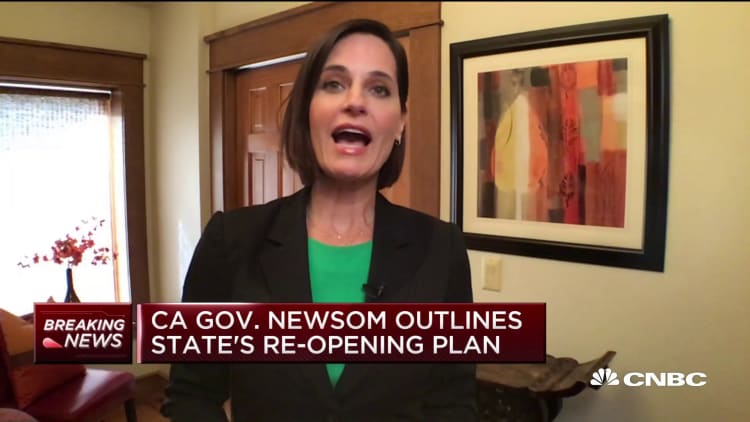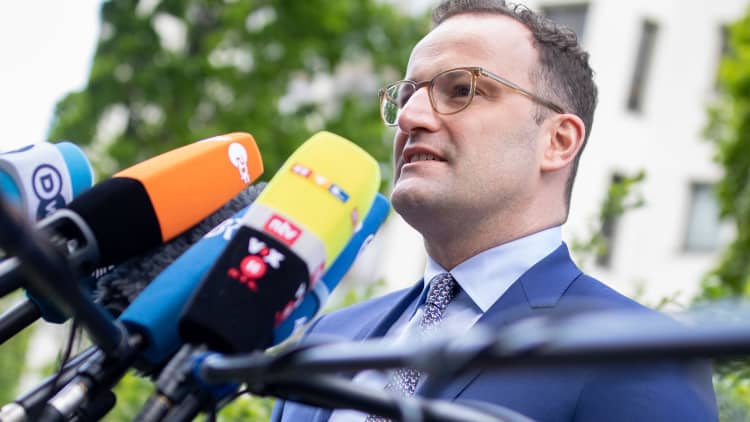Governments around the world are developing mobile apps to help reduce the spread of the coronavirus using a method known as "contact tracing."
Contact tracing is the process of asking infected patients who they've recently come into contact with. The logic being that, by doing so, health authorities are able to better identify the people at risk of infection and have them quarantined or monitored.
Experts say that logging that data through a smartphone would be a much more effective strategy, but there are concerns over what that means for users' privacy. Some of the initiatives use Bluetooth to notify people when they've been near someone infected with coronavirus, while others use GPS location data, which is harder to anonymize.
CNBC runs through all the major global initiatives on contact tracing technology — and how the companies and governments behind them are thinking about privacy.
US
The U.S. is yet to endorse any form of contact tracing technology, but there are a number of initiatives across different states looking to develop such systems.
One, from a team of researchers at the Massachusetts Institute of Technology, uses anonymized GPS data and Bluetooth to log interactions and alert people if they've come into contact with someone who has Covid-19.
Called Safe Paths, those behind the initiative call it a "privacy-first" solution, as it would let users match a personal log of location data on their phone with an anonymized location history of infected patients.

There are also two other apps, Stanford University-backed Covid Watch and Seattle-based CoEpi, which are working with MIT's Safe Paths to achieve a technical standard that works across different platforms and regions.
Meanwhile, the director of the Centers for Disease Control and Prevention, Robert Redfield, has said that the U.S. should introduce "very aggressive" contact tracing in combination with testing to tackle the pandemic.
He didn't promote the use of smartphone data to achieve such contact tracing, but said such ideas were under "aggressive evaluation."
Europe
There are several projects in Europe working to develop contact tracing platforms to curb the spread of Covid-19. Such technology could also be vital to help life return to normal as some countries in the continent search for an exit strategy.
The U.K.'s National Health Service is creating a contact tracing app that would use Bluetooth to gather anonymous proximity information to alert someone if they've been near an infected individual and need to self-isolate.
Addressing privacy concerns, Health Secretary Matt Hancock has said any data gathered through the NHS app will be handled ethically and securely and no longer than is necessary.
It comes after Oxford University researchers recommended the use of such an app to slow the rate of transmission. Academics at the university recommend that any contact-tracing app should however be complimentary to other measures like social distancing and testing.

In Europe, there is a regulatory incentive for contact tracing initiatives to get privacy right. That's because the General Data Protection Regulation, a sweeping privacy law introduced in 2018, has given consumers more rights over their data and how it's used by organizations.
That's been top of mind in Germany, where the government is working on an app that tracks possible chains of Covid-19 contagion with Bluetooth.
Chris Boos, one of the developers behind the app, has explicitly said he doesn't want to "recreate the situation in some Asian countries where people are completely exposed."
Boos is also part of a broader effort called Pan-European Privacy-Preserving Proximity Tracing, or PEPP-PT, which would use low-energy Bluetooth to log proximity data locally on a user's smartphone instead of a central server.
Asia
Asia is where the coronavirus outbreak originated, so it's no surprise that the continent has also been home to the most active digital contact tracing schemes.
Singapore rolled out an app last month that exchanges short-distance Bluetooth signals between handsets when users are near one another. Not long after launch, the city-state said it would make the source code of that software freely available to developers worldwide.
South Korea has used cell phone location data for contact tracing, while China's government has deployed tracking apps with QR codes in order to control people's movements and contain the virus.

The latter has triggered fears over the potential for abuse of technology by some governments for surveillance. In Singapore's case, the health ministry has tried to allay such concerns, claiming it doesn't collect personal data or location information.
India meanwhile also has an app that uses Bluetooth and location data to alert users if they have come into contact with someone who has tested positive for the virus. But some have criticized the initiative for being too vague and open to privacy abuses.
Google and Apple
Last week, Google and Apple announced that they've been working together on software that traces the contacts of "affected individuals" by using Bluetooth technology.
The two tech giants' mobile operating systems, Android and iOS, collectively power more than 99% of the world's smartphones. That makes their involvement much more significant for the tracking of the coronavirus than individual government efforts.
Google and Apple are however working with public health officials to develop the technology.
First off, they're releasing developer tools known as application programming interfaces, or APIs, next month to allow official contact-tracing apps to operate across Android and iOS.
The next step will be for both firms to build Bluetooth-based contact tracing into their own operating systems, which suggests people will be able use it without downloading an app. Users will have to opt in to get access to the feature though.
Google and Apple say users won't need to worry about privacy breaches as the companies won't be collecting personal or location data.
"Privacy, transparency, and consent are of utmost importance in this effort, and we look forward to building this functionality in consultation with interested stakeholders," both companies said Friday.


